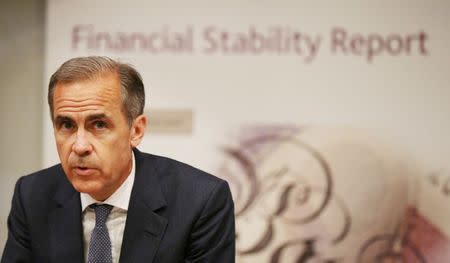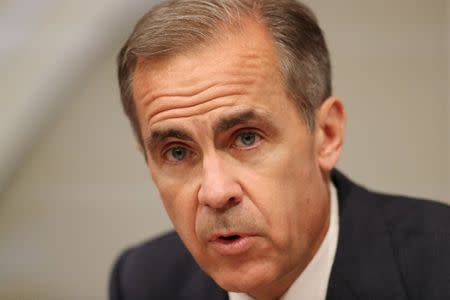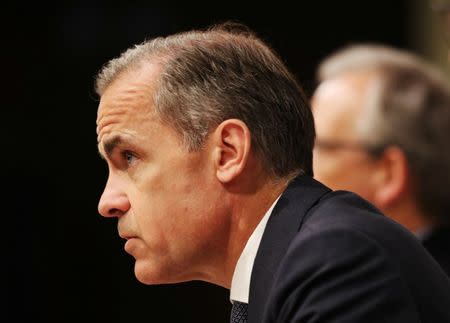Bank of England tightens credit rules for banks after Brexit resilience
By David Milliken and Huw Jones LONDON (Reuters) - The Bank of England tightened its controls on lending on Tuesday and said it was likely to make British banks hold an extra 11.4 billion pounds of capital as it decided the risk of a big hit to the economy from the Brexit vote had passed. After the referendum decision to leave the European Union a year ago, the BoE cut to zero a requirement that banks create a capital buffer as it sought to offset an expected drying up of lending. But Britain's economy has performed more strongly than expected since the vote, despite some more recent signs of a slowdown. Some of the central banks' interest rate setters think it is already time to raise its main interest rate. On Tuesday the BoE's separate Financial Policy Committee declared that overall risks to Britain's economy from its financial system were at a "standard" level. The FPC raised its counter-cyclical capital buffer (CCyB) - which rises and falls along with the ups and downs of the economy - to 0.5 percent from zero with a one-year implementation phase. It said that it expected to raise it further to 1.0 percent in November. One percent is the level that reflects an economy that is running normally. Bank shares fell after the BoE announcement but recovered soon after to their levels earlier on Tuesday. The BoE also said it was concerned that lenders were placing undue weight on recent low losses which could only be achieved in the current benign conditions. "As is often the case in a standard environment, there are pockets of risks that warrant vigilance," the BoE said. The BoE said it was continuing to oversee banks' preparations for Brexit, including for the possibility of Britain leaving the EU in 2019 without securing any trade deal, cutting off banks from their European customers which could undermine financial stability. "Such scenarios are where contingency planning and preparation will be most valuable," the BoE said. Each 0.5 percent increase adds 5.7 billion pounds to British banks' capital requirements, though many banks already hold capital in excess of the minimum so may not need to raise fresh funds. TIGHTER NEW RULES FOR LENDING The BoE also said British regulators would publish tighter rules on consumer lending next month, and that it would bring forward planned checks on whether banks could cope with consumer loans losses to September from November. Existing restrictions on high loan-to-income mortgage lending were likely to stay for the long term, the BoE said, and it also tweaked the rate against which lenders must test borrowers' ability to repay their mortgages. The BoE said some global risks it had previously identified had not crystallised. But it warned of dangers from China, where private-sector borrowing is now more than two and a half times annual economic output. "High debt makes China vulnerable to shocks. This could affect the global economy and UK banks." It also warned that British corporate bonds and commercial real estate may be overvalued. Both had their valuations boosted by low interest rates, but did not appear to take into account that these low interest rates reflected a weak economic outlook. "Current London West End office prices are well above the range of estimated sustainable valuation levels," it said. The FPC raised the minimum leverage ratio for British banks to 3.25 percent from 3.0 percent, to reflect last year's exclusion of central bank reserves from the calculation of capital. This exclusion was designed to ensure that monetary policy measures like quantitative easing did not crimp lending. (Editing by William Schomberg and Pritha Sarkar)

 Yahoo News
Yahoo News 









